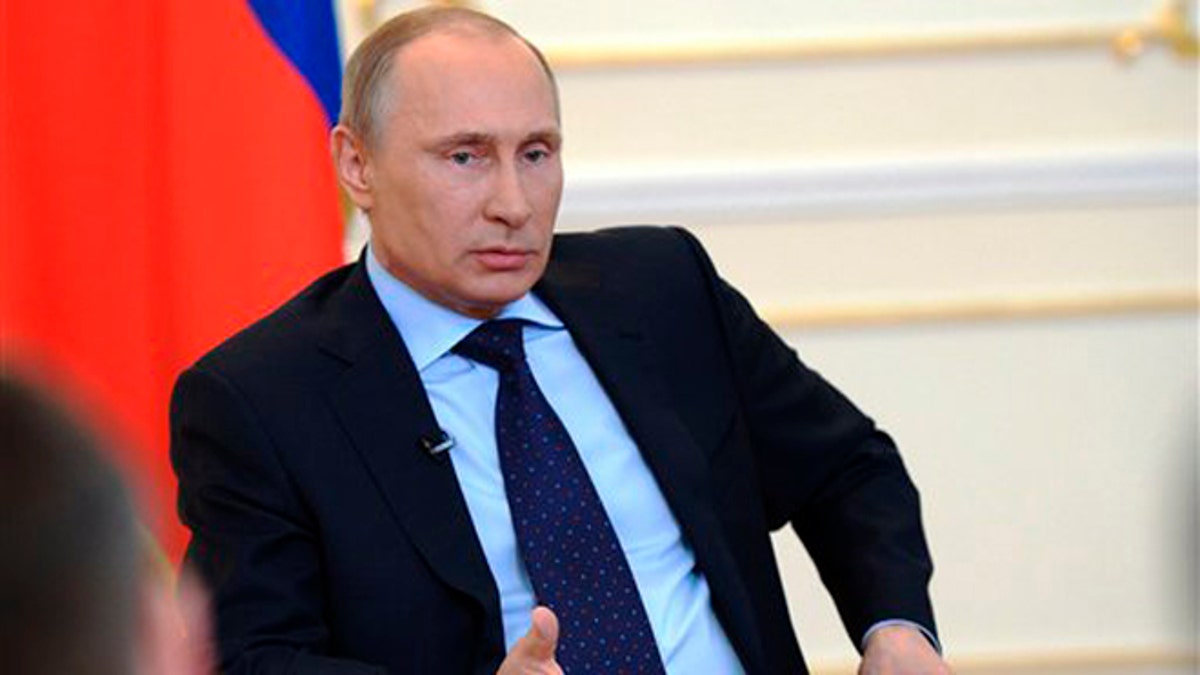
March 4, 2014: President Vladimir Putin answers journalists' questions on current situation in Ukraine at the Novo-Ogaryovo presidential residence outside Moscow. (ap)
In 2012, President Obama, in the third presidential debate with Mitt Romney, snarkily quipped “the 1980s are calling to ask for its foreign policy back… the cold war is over.” But Russian President Vladimir Putin, the former KGB colonel and head of the Federal Security Bureau, is playing a decidedly different game.
The evolution of Putin is one that has taken him from cold warrior to strategic conqueror.
Americans, by playing checkers when the Russians are playing chess, are faced with a nearly unwinnable predicament with Ukraine and its 46 million people hanging in the balance.
[pullquote]
Here are three things to know about Putin.
1. Putin’s ego is what's causing chaos in Ukraine
Putin’s goal--far from helping Ukraine to join the New World Order--is to bring it back to the Russian sphere of influence at a modest cost.
He is eager for Ukraine to join a Russian Customs Union with other former Soviet republics (like Belarus and Kazakhstan) even poorer and less democratic than Ukraine.
Putin’s offer and withdrawal of a $15 billion dollar loan and occupation of the Crimea is meant to bring Ukraine back under Russian influence.
The Ukrainians, however, are decidedly mixed. A recent poll showed 39 percent want to integrate with the EU, while 37 percent want to come closer to Russia. This major divide is helping to fuel tensions.
2. Putin is concerned with his larger legacy
Ukraine has become a pawn in a larger chess match that is Putin’s legacy. He has indicated he will run for re-election and many believe wants to die in office, a tradition going from the Czars to the Soviet Communist leaders.
When Putin rode in on his white horse in 2000 after a disastrous Boris Yeltsin presidency, he called in his first Presidential address for restoring Russian power.
Putin has recently been able to raise Russia’s profile in the world. Since the U.S. has partially withdrawn from the Middle East, Russia has been the big winner in Syria, Egypt and Iran.
Russia has a $2 billion dollar arms deal on the table with Egypt and is protecting Iran as it marches forward toward nuclear weapons.
The country has been lauded for its successful Olympic Games and Putin has even been mentioned by Forbes as the most powerful man in the world.
Yet, the future success of Russia is still up for debate.
The Russian economy, with oil and gas as its main exports and a weak agricultural and consumer sector, is going nowhere.
Now as the 61-year-old Putin looks to the next chapter – it’s all about propping up Russia as the perceived international power.
3. Putin's power is shifting
Putin’s power base in Russia is shifting. While it used to be based on the educated classes in Moscow and Saint Petersburg now he’s shifting toward the less educated Russians in smaller towns and rural areas.
For example, there was a poll that showed 88 percent of Russian people don’t like homosexuals.
Putin’s attack on the LGBT community consolidated his power base. Putin probably doesn’t care about homosexuality, but rather is tactful politician who tries to get political “wins” when he can. With a weak economy, he must turn to pandering to prejudices of his base. And Russian patriotism and revival of Russian power is his path to staying in power.
Obama’s right: the Cold War is over. But a lot has changed with Putin since the Cold War and we have a lot of catching up to do.
Refusing to get involved in major international conflicts will only lead the United States in one direction: the revival of Russia as a great power which poses a direct challenge to the United States.
